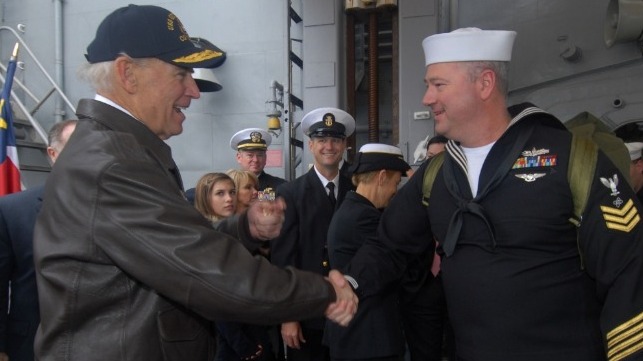How Would U.S. Trade and Defense Policy Change Under Biden?

[By Prof. Neta Crawford]
President-elect Biden has signaled he will do three things to reset the U.S.‘s foreign policy. First, Biden will change the tone of U.S. foreign relations. The Democratic Party platform called its section on military foreign policy “renewing American leadership” and emphasized diplomacy as a “tool of first resort.”
Biden seems to sincerely believe in diplomacy and is intent on repairing relations with U.S. allies that have been damaged over the last four years. Conversely, while Trump was, some say, too friendly with Russian President Vladimir Putin, calling him a “terrific person,” Biden will likely take a harder line with Russia, at least rhetorically.
This change in tone will also likely include rejoining some of the treaties and international agreements that the United States abandoned under the Trump administration. The most important of these include the Paris Climate Agreement, which the U.S. officially withdrew from on Nov. 4, and restoring funding to the United Nation’s Intergovernmental Panel on Climate Change.
If the U.S. is to extend the New START nuclear weapons treaty, the arms control deal with Russia due to expire in February, the incoming Biden administration would likely have to work with the outgoing administration on an extension. Biden has also signaled a willingness to rejoin the Iran nuclear deal jettisoned by Trump, if and when the Iranians return to the limits on nuclear infrastructure imposed by the agreement.
Second, in contrast to the large increases in military spending under Trump, President-elect Biden may make modest cuts in the U.S. military budget. Although he has said that cuts are not “inevitable” under his presidency, Biden has hinted at a smaller military presence overseas and is likely to change some priorities at the Pentagon by, for instance, emphasizing high-tech weapons. If the Senate – which must ratify any treaties – flips to Democrats’ control, the Biden administration may take more ambitious steps in nuclear arms control by pursuing deeper cuts with Russia and ratifying the Comprehensive Test Ban Treaty.
Third, the Biden administration will likely continue some Bush, Obama and Trump foreign policy priorities. Specifically, while a Biden administration will seek to end the war in Afghanistan, the administration will keep a focus on defeating the Islamic State and al-Qaida. Biden has said that he would reduce the current 5,200 U.S. forces in Afghanistan to 1,500-2,000 troops operating in the region in a counterterrorism role. The Biden administration is likely to continue the massive nuclear weapons modernization and air and naval equipment modernization programs begun under the Obama administration and accelerated and expanded under Trump, if only because they are popular with members of Congress who see the jobs they provide in their states.
And like the Bush, Obama and Trump administrations, the Biden administration will prioritize the economic and military threats it believes are posed by China. But, consistent with its emphasis on diplomacy, the Biden administration will likely also work more to constrain China through diplomatic engagement and by working with U.S. allies in the region.
Neta Crawford is Professor of Political Science and Department Chair at Boston University.
This editorial excerpt appears courtesy of The Conversation and may be found in its original form here.
The opinions expressed herein are the author's and not necessarily those of The Maritime Executive.
